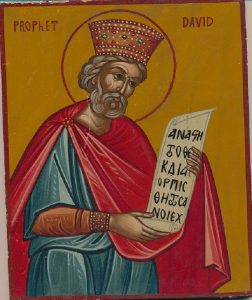 On this Sunday, we commemorate three men who had a relationship with Jesus: David, his forefather; Joseph, his foster father; and James, his brother through Joseph. Each of these man were shown mercy by God. David committed a great sin, to win the wife of Uriah, he had Uriah put into the front lines of battle, so that he was killed. The prophet Nathan brought this sin to light and David did repentance and lost his son.
On this Sunday, we commemorate three men who had a relationship with Jesus: David, his forefather; Joseph, his foster father; and James, his brother through Joseph. Each of these man were shown mercy by God. David committed a great sin, to win the wife of Uriah, he had Uriah put into the front lines of battle, so that he was killed. The prophet Nathan brought this sin to light and David did repentance and lost his son.
Joseph found Mary pregnant and decided to divorce her, but an angel told him to take her as his wife. James was among Jesus’ relatives who did not accept him as a prophet, but after the resurrection, he repented and became the leader of the church at Jerusalem.
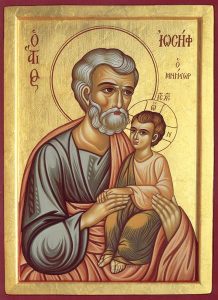 We might remember also three women who were among Jesus’ foremothers. Rachel was the wife of Jacob, who loved her more than Leah. However, when Jacob worked for seven years for Laban to win Rachel’s hand, Laban insisted he marry his eldest daughter Leah. Jacob then worked another seven years for Rachel. However, Rachel was barren until finally she gave birth to Joseph, Jacob’s favorite son. Jacob took his family and fled Laban, and Rachel stole Laban’s family icons. When Laban caught up with Jacob, Jacob cursed the thief of his icons, not knowing that it was his beloved wife Rachel. The curse was fulfilled when Rachel died giving birth to Benjamin. Rachel is mentioned in today’s Gospel as weeping when the children of Bethlehem are massacred by King Herod, but the gospel says, “no comfort for her, for they are no more.”
We might remember also three women who were among Jesus’ foremothers. Rachel was the wife of Jacob, who loved her more than Leah. However, when Jacob worked for seven years for Laban to win Rachel’s hand, Laban insisted he marry his eldest daughter Leah. Jacob then worked another seven years for Rachel. However, Rachel was barren until finally she gave birth to Joseph, Jacob’s favorite son. Jacob took his family and fled Laban, and Rachel stole Laban’s family icons. When Laban caught up with Jacob, Jacob cursed the thief of his icons, not knowing that it was his beloved wife Rachel. The curse was fulfilled when Rachel died giving birth to Benjamin. Rachel is mentioned in today’s Gospel as weeping when the children of Bethlehem are massacred by King Herod, but the gospel says, “no comfort for her, for they are no more.”
We might also mention Ruth, who was a foreigner – like the Magi. She married a Hebrew man from Bethlehem who died, and Ruth followed her mother-in-law back to Bethlehem, and there tricked Boaz into marriage, becoming the great-grandmother of David and ancestor of our Lord.
We might also mention Tamar, who lost her husband, whose brother refused to have children by her. She disguised herself as a prostitute and became pregnant with her father-in-law, Judah, who wanted to have her executed for prostitution until he was shown to be the father. So she, too, became an ancestor of Jesus through trickery.
Does not today’s feast remind us that we all have a relationship now with God through our Lord Jesus Christ and we are all in need of his mercy.
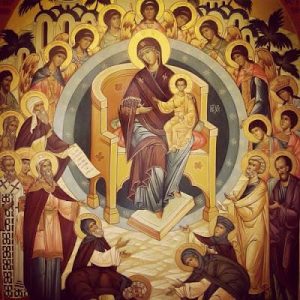 Many Byzantine feasts have a commemoration on the day after a great feast called a “synaxis,” that is, an “assembly” or “gathering” in honor of one who participated in the feast. No more honorable person could ever be found than the holy Lady, the Mother of God.
Many Byzantine feasts have a commemoration on the day after a great feast called a “synaxis,” that is, an “assembly” or “gathering” in honor of one who participated in the feast. No more honorable person could ever be found than the holy Lady, the Mother of God.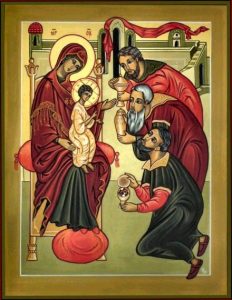 The Christmas Day Liturgy Gospel is the story of the Magi, the astrologers from Persia, who discover the birth of the King of Kings by observing the stars. In this way, they are brought from the pagan superstition to worship of the one true God.
The Christmas Day Liturgy Gospel is the story of the Magi, the astrologers from Persia, who discover the birth of the King of Kings by observing the stars. In this way, they are brought from the pagan superstition to worship of the one true God.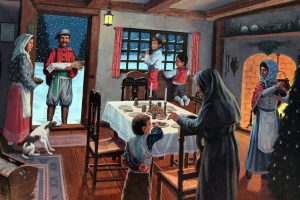 A twelve-dish Christmas Eve supper is traditionally prepared in many Eastern European and Northern European cultures, especially those that were formerly part of the Polish-Lithuanian Commonwealth, including Polish, Lithuanian and Ukrainian. The meal (Lithuanian: Kūčios, Polish: Wigilia or wieczerza wigilijna, Ukrainian: Свята вечеря, Sviata vecheria) consists of twelve meatless dishes representing the twelve months of the year. The tradition of the supper can be traced back to pre-Christian times and connected with remembrance of the souls of deceased ancestors.
A twelve-dish Christmas Eve supper is traditionally prepared in many Eastern European and Northern European cultures, especially those that were formerly part of the Polish-Lithuanian Commonwealth, including Polish, Lithuanian and Ukrainian. The meal (Lithuanian: Kūčios, Polish: Wigilia or wieczerza wigilijna, Ukrainian: Свята вечеря, Sviata vecheria) consists of twelve meatless dishes representing the twelve months of the year. The tradition of the supper can be traced back to pre-Christian times and connected with remembrance of the souls of deceased ancestors.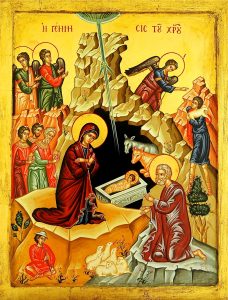 Christmas is a very special celebration for Ukrainians. Many traditions and rituals are observed, and each aspect of Christmas has a special meaning. Everyone is wearing their best clothes and the house has been cleaned top to bottom for the day, although all spider webs are left untouched. Legends about the generosity of spiders at Christmas mean they are not to be disturbed. What else is going on in the house?
Christmas is a very special celebration for Ukrainians. Many traditions and rituals are observed, and each aspect of Christmas has a special meaning. Everyone is wearing their best clothes and the house has been cleaned top to bottom for the day, although all spider webs are left untouched. Legends about the generosity of spiders at Christmas mean they are not to be disturbed. What else is going on in the house?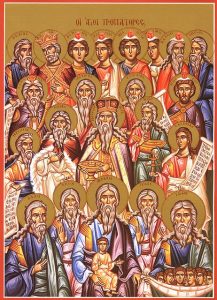 Colossians 3:4: “When Christ who is our life appears, then you also will appear with him in glory.”
Colossians 3:4: “When Christ who is our life appears, then you also will appear with him in glory.”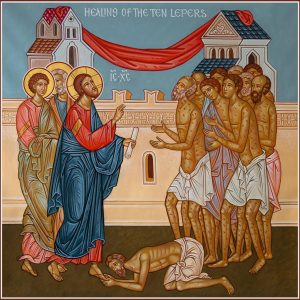 Ephesians 6:10-17; Luke 17:12-19
Ephesians 6:10-17; Luke 17:12-19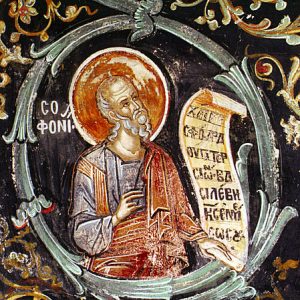 Today, the Byzantine and the Latin Churches liturgically recalls the Prophet of Zephaniah. In Hebrew, the name means “Yahweh has concealed.” Zephania is known in biblical study as the ninth of twelve minor prophets (taken in literary order). The Latin Church remembers the Prophet as the one who inspired the hymn, Dies irae. The Prophet gave his message to Jerusalem to be united in their worship and faith in the true God otherwise face God’s judgement, “the Day of the Lord.”
Today, the Byzantine and the Latin Churches liturgically recalls the Prophet of Zephaniah. In Hebrew, the name means “Yahweh has concealed.” Zephania is known in biblical study as the ninth of twelve minor prophets (taken in literary order). The Latin Church remembers the Prophet as the one who inspired the hymn, Dies irae. The Prophet gave his message to Jerusalem to be united in their worship and faith in the true God otherwise face God’s judgement, “the Day of the Lord.”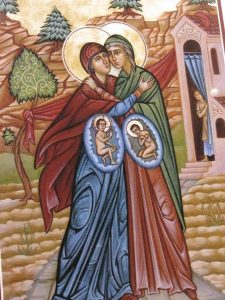 On the Fourth Sunday [that is, today] before Christmas, the Syrian Church remembers the Visitation of Mary to her cousin Elizabeth. In the Byzantine Church, there is no feast of the Visitation, though this gospel is the common gospel for Matins of Feasts of the Theotokos.
On the Fourth Sunday [that is, today] before Christmas, the Syrian Church remembers the Visitation of Mary to her cousin Elizabeth. In the Byzantine Church, there is no feast of the Visitation, though this gospel is the common gospel for Matins of Feasts of the Theotokos.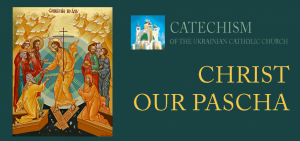 Bishop Peter Stasiuk, C.Ss.R. of Australia
Bishop Peter Stasiuk, C.Ss.R. of Australia